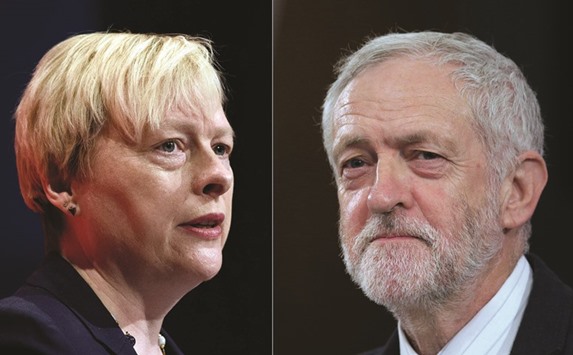Britain’s main opposition Labour Party finally faces a leadership battle after a challenger stepped forward yesterday, following a Brexit vote that has pitched politics into turmoil and the economy into uncertainty.
Lawmaker Angela Eagle said she would stand against veteran socialist Jeremy Corbyn, the embattled head of the left-of-centre party.
Eagle announced her bid following the collapse of talks aimed at resolving a deep split among the party’s lawmakers over Corbyn’s leadership and his lukewarm campaigning for Britain to stay in the EU.
“On Monday morning I will announce my candidature for leader of the Labour Party,” she said.
“I will explain my vision for the country and the difference a strong Labour Party can make.”
Corbyn, who has lost the support of at least three quarters of his lawmakers, had “failed to fulfil his first and foremost duty, that is to lead an organised and effective Parliamentary Labour Party (PLP)”, said Eagle.
She said Labour under Corbyn could not hold the government to account or demonstrate it was ready to form a government itself in the event of a general election.
Eagle, 55, was the shadow first secretary of state — implying seniority over other front-bench spokespersons — before she and a host of others quit the so-called shadow cabinet en masse over Corbyn’s leadership in the referendum on Britain’s membership of the European Union.
The party backed Britain staying in the EU, but she and others blasted Corbyn for what they said was his lacklustre effort in persuading Labour voters.
Eagle said he had led with “half-hearted ambivalence”.
In the June 23 referendum, 52% of voters opted for Britain to leave the EU, with many traditional Labour heartlands voting out.
Anger among “Remain” voters is still resonating.
The British government yesterday formally rejected a petition signed by more than 4.125mn people calling for a second referendum with a minimum 60% threshold and 75 turnout bar.
“We must now prepare for the process to exit the EU and the government is committed to ensuring the best possible outcome for the British people in the negotiations,” it said in a statement.
Labour members of parliament staged a vote of no confidence in Corbyn on June 28, in which 17% backed him and 75% voted against him.
Despite this, Corbyn has vowed to battle on as leader, citing a groundswell of support in the party membership.
Corbyn told Sky News television yesterday he did not find his predicament “demeaning”.
“My job is to try to point a different political course for everyone and that’s what I’m doing and I’m very happy to be doing it,” he said.
A spokesman for Corbyn insisted he would continue as leader.
“Jeremy Corbyn has reached out to Labour MPs and made clear he wants to work with them to carry out his role as elected leader of the party,” the spokesman said.
“Jeremy... will not betray the hundreds of thousands of people who elected him for a different direction for the Labour Party and a different kind of politics.
“He will remain leader of the Labour Party and will contest any leadership challenge if one is mounted.”
In September, rank outsider Corbyn was elected Labour leader with 59.5% of the vote, made up of Labour Party members, members of affiliated trade unions and people who paid £3 ($3.90, 3.5 euros) to get a vote.
Eagle, a former trade unionist — and a junior chess champion in her youth — would become the first openly gay leader of one of Britain’s main political parties if she wins the contest.
Labour’s deputy leader Tom Watson had been in talks with trade unions trying to broker a peace deal, but abandoned the process yesterday, saying Corbyn’s refusal to stand down in any circumstances meant there was no chance of progress.
“There is no realistic prospect of reaching a compromise that satisfies the majority of colleagues in the PLP,” he said.
Labour’s divisions could be exposed again over the issue of Britain’s nuclear deterrent.
Parliament will vote on replacing the submarines which carry Britain’s Trident nuclear missiles on July 18, Prime Minister David Cameron announced yesterday.
Corbyn is opposed to nuclear weapons, though many Labour MPs are likely to support maintaining the deterrent.

Angela Eagle and Jeremy Corbyn.
